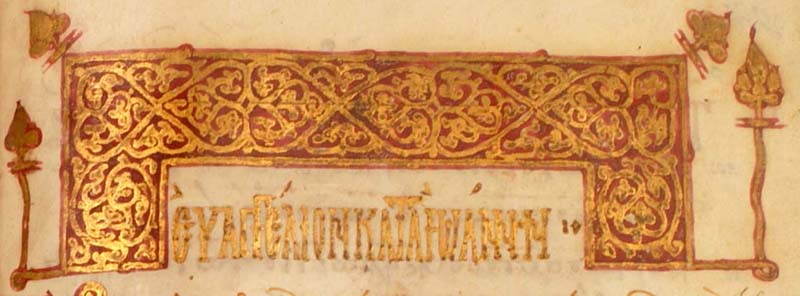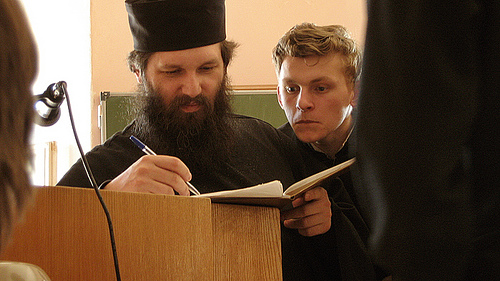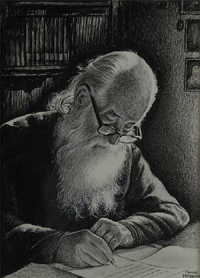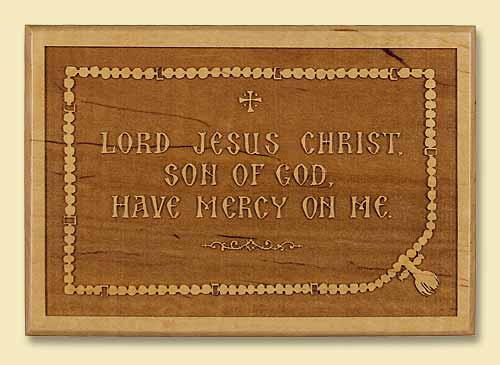 CHRIST IS RISEN!
CHRIST IS RISEN!Today is
Earth Day, at least in the Northern Hemisphere. While I hesitate to appear churlish or to hinder anyone from reflecting on our very real duties towards creation, I would submit that Orthodox Christians have very good reason to be wary of what Earth Day represents.
It should come as no surprise that Earth Day is a product of the 1960s, having been formally established in 1970 largely through the efforts of
Gaylord Nelson, Democrat Senator from Wisconsin. The ideological context in which he conceived of Earth Day is chilling: he was deeply influenced by the movement towards zero population growth, which, needless to say, placed so-called "reproductive rights" at the center of its agenda. (The organization that called itself "
Zero Population Growth," founded in 1968, has since changed its name to the less threatening sounding "
Population Connection" – which sounds to me rather like a PBS show for children.) It was this same Senator Nelson that called for hearings on the safety of
combined oral contraceptive pills, hearings that have gone down into history as the
Nelson Pill Hearings. (As an ironic side note, Senator Nelson and others were also deeply concerned about the effects of global
cooling.) The word
eugenics springs involuntarily to mind. How evil the irony that the promotion of Earth's health was thought to depend upon putting an end to the growth of humanity.
Then there is the inevitable connection between modern environmentalism and neo-paganism. The Earth becomes, not a gift of God's creation, but a sacred, self-subsisting, and life-giving entity in and of itself. Western civilization in general, and Christianity in particular, are more often than not assigned blame for environmental pollution. Environmentalism becomes a substitute religion (and a highly dogmatic one at that), with its own feast days.
Here is how
Margaret Mead – that influential but utterly
fraudulent anthropologist – spoke of Earth Day in 1978 (emphasis mine):
EARTH DAY is the first holy day which transcends all national borders, yet preserves all geographical integrities, spans mountains and oceans and time belts, and yet brings people all over the world into one resonating accord, is devoted to the preservation of the harmony in nature and yet draws upon the triumphs of technology, the measurement of time, and instantaneous communication through space.
EARTH DAY draws on astronomical phenomena in a new way – which is also the most ancient way – using the vernal Equinox, the time when the Sun crosses the equator making night and day of equal length in all parts of the Earth. To this point in the annual calendar, EARTH DAY attaches no local or divisive set of symbols, no statement of the truth or superiority of one way of life over another. But the selection of the March Equinox makes planetary observance of a shared event possible, and a flag which shows the Earth as seen from space appropriate.
This is a very good reminder, incidentally, that paganism and religious and moral relativism are close cousins. Although, really, her words are disingenuous: environmentalism really
is all about "the superiority of one way of life over another." It's also worth noting that – coincidence or no coincidence – Earth Day is marked annually on
Lenin's birthday. I hope these few points should be sufficient to give pause for thought.
None of which is to deny that we really have done horrible things to the environment or to imply that we are not called to stewardship of creation. It strikes me as tragic that the environmental movement is almost wholly a creature of the political Left. It's quite understandable – but, I think, deeply misguided – that many conservatives would adopt a largely reactionary stance to environmental issues, denying the reality of the environmental travesty that surrounds us while applauding all the sprawl that comes with the unrestrained free market.
We Orthodox do, in fact, have an alternative to Earth Day. In 1989 the Day of Prayer for Creation was
established by the Ecumenical Patriarchate and accepted by other local Orthodox Churches. Notice the words
prayer and
creation. It is celebrated on September 1, the first day of the liturgical year. In fact, Monk Gerasimos (+1991) of the Skete of St Anne on Mt Athos, official hymnographer of the Great Church, composed an Office for the Preservation of Creation (the Vespers from which can be read in English, translated by Fr Ephrem (Lash),
here.) There is very much that could be said here, but I think it sufficient to cite one small passage from the
words of the
Elder Paisios of Mt Athos:
This grass is an icon; this stone is an icon; and I can kiss it, venerate it, because it is filled with God's grace.
The world is not for us to take things from, but a place where we cast off our passions and desires.
There is no doubt that we need to assist in reversing the profound violence we have done to God's creation. But our premises should be above all theological or, more specifically, Eucharistic – and not neo-pagan, relativistic, or anti-Christian. The question of how exactly this would look in terms of policy is one that I leave to others. For more, see especially Dr Elizabeth Theokritoff, "
The Orthodox Church and the Environmental Movement," and Metropolitan Kallistos' essay "
Through Creation to the Creator," and a large collection of similar resources
here.
UPDATE: See the excellent follow-up posts at
Orrologion and
Logismoi.
 Here follows my translation of a word by Bishop Benjamin of Saratov and Balashov (+1955) entitled "Two Teachers and a Consolation in Our Life." It serves as a good antidote to the sort of jejune and ultimately blasphemous "Prosperity Gospel" nonsense one hears far too often:
Here follows my translation of a word by Bishop Benjamin of Saratov and Balashov (+1955) entitled "Two Teachers and a Consolation in Our Life." It serves as a good antidote to the sort of jejune and ultimately blasphemous "Prosperity Gospel" nonsense one hears far too often:


























